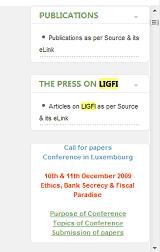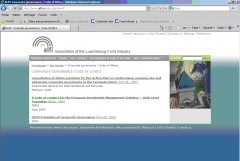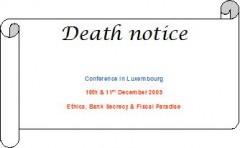09/21/2009
ALFI : new blunder about Madoff (update)
The ALFI’s task force issued a report on Madoff that was presented last Friday. The report states two key initiatives: publication of a code of conduct stamped Alfi, having to list the best practices and recommendations for a better governance as regards investment fund; and the making of a guide of good practices as regards the depositary (see Paperjam and LFF)
Publication of a code of conduct stamped ALFI?
But they used to have one… that was unfortunately withdrawn.
Let’s have a look at their publications.
While ALFI's board of directors and president have changed, the Association's ambitions remain unchanged. We want to anticipate and prepare the future by putting in place training programs for the young professionals of our industry, by educating the investors, by implementing the code of ethics and guidelines for auto-regulation, by working out meaningful statistical data and feasibility studies
A Code of Ethics for the Luxembourg Investment Fund Industry
Not a new idea, but a new emphasis. The will to implement the highest standards for the whole financial sector is of primary importance to the Luxembourg fund industry. In 1998, ALFI issued a code of ethics which set up rules for the various actors in the investment fund industry, whether located in the Grand Duchy or active in Luxembourg from abroad. The main goal of this code of ethics is explicitly to provide additional protection to investors
Revision of ALFI's Ethical Code
The "ethical code" sub-committee of the Legal Committee has initiated a revision of ALFI's ethical code. In fact the Association's current ethical code dates from 1998 and concentrates mainly on questions related to the prevention of money laundering, insider trading offences and investor information. Although no disciplinary proceedings are planned and CSSF has not wished to make this code compulsory for the whole investment fund sector, all institutions or investment funds which have joined ALFI should, in principle, comply with this ethical code. Since the adoption of this regulatory corpus, several circulars relating to deontology have been published by the supervisory authority, in particular circular 2000/15 based on the law transposing the Directive on Investment Services and concerning the rules of conduct applicable to professionals in the financial sector.
Of course this circular is only addressed to financial sector professionals (FSPs), but as ALFI's ethical code covers all those involved in the investment fund industry, the working group has considered it useful to adapt it in accordance with the rules of
conduct issued by CSSF.
The members of the working group have decided to continue to set out in detail the obligations of each category of investment fund professionals and not to adopt the process set out in circular 2000/15, which describes these obligations on an issue by issue basis.
The problem is that I had noticed in 2006, that their code was no longer online.
It was replaced by external codes that were never ever appropriated.
17:30 Posted in Luxembourg | Permalink | Comments (0)
09/20/2009
Death notice
I have visited yesterday the LIGFI (Luxembourg Institute for Global Financial Integrity) website.
I have noticed that the call for papers for a Conference in Luxembourg about “Ethics, Bank Secrecy & Fiscal Paradise” that was scheduled on 10th & 11th December 2009 is no longer advertised online.
Before

Now

When the LIGFI was launched in May the press release stated the institute would initiate its first open dialogue within the global financial sector and with public and private institutions by organizing a Conference on “Ethics, bank secrecy and fiscal paradise” in Luxembourg on the 10th and 11th of December, 2009.
The purpose of the Luxembourg Institute for Global Financial Integrity is to address with its members, in all impartiality and independence, ethical conduct and its standards and practices in regard to the principles of integrity, which are fairness, transparency, responsibility and accountability (See mission statement)
Unfortunately, in the meantime, a critical report about Luxembourg was victim of censorship under a scandalous pressure on NGOs in a democracy. The report that is perfectible (figures cannot be accurate as data are under banking and professional secrecy) but it addresses key issues. It was withdrawn and repudiated by the Cercle de Cooperation, that ordered the study.
Additionally the press reported that a preliminary report by the Financial Action Task Force FATF is very critical about Luxembourg. Professionals and politicians fustigate the lack of professionalism of the FATF team members and/or the bad faith. They only forget the visible permissiveness in the center:
- No criminal liability of legal persons despite and injunction last year
- 50% of banks never report any declaration of suspicion
- Many companies have a statutory auditor that is neither member of the IRE nor the OEC. There are many statutory auditors from “exotic jurisdictions” that only exist in the Luxembourg Corporate Registration.
- Very little cases before the courts: because of the small size there are many conflicts of interests, many cases of "professional incest". The direct consequence is the small number of crime cases or corruption cases, which are of concern in official reports: “The scarce number of financial crime cases is of concern, particularly for a country that has such a large financial sector.” (Cf. p. 342 of the Narcotic Control Strategy report 2009); “the number of cases coming before the courts appears to be very small”, particularly because of lack of legal and other resources, and the ease with which companies can be established in Luxembourg.” (Cf. page 18 of the GRECO PHASE III Report "Criminalisation of corruption" [theme I] in Luxembourg).
- Ratios that do not comply with international benchmarks (little control and little sanctions compared to other jurisdictions including Monaco)
- Professionals are bold enough to state they influence the regulator. I have no problem for a consultation in the drafting of laws and regulation. But the problem in Luxembourg is that professionals’ opinion is practically an assent.
The list is not exhaustive.
But let’s go back to the LIGFI: as the LIGFI team members live in the bowl they did not know that such body already exist since September 2006: Global Financial Integrity was launched in September 2006 following the publication of Capitalism’s Achilles Heel: Dirty Money and How to Renew the Free-Market System, (John Wiley & Sons 2005), written by Center for International Policy Senior Fellow Raymond Baker. This book demonstrates that the problem of illicit financial flows, and the financial infrastructure supporting it, is enormous. For example, some 70 tax havens and secrecy jurisdictions are in operation across the globe and millions of dummy corporations shield owner’s identities. And the scourge of dirty money is getting worse. Indeed, global corruption has not diminished despite ten years of effort, assets now stashed in tax havens around the globe are estimated at $11.5 trillion, and non-bank cash deposits outside the country of origin are rising. Global Financial Integrity (GFI) promotes national and multilateral policies, safeguards, and agreements aimed at curtailing the cross-border flow of illegal money. In putting forward solutions, facilitating strategic partnerships, and conducting groundbreaking research, GFI is leading the way in efforts to curtail illicit financial flows and enhance global development and security.
This body has just completed a conference on “Increasing Transparency in Global Finance: A Development Imperative”:
The findings are that « The massive flow of illicit money out of developing nations, estimated at some $1 trillion per year, outpaces current levels of foreign aid by a ratio of nearly 10 to 1. Consisting of tax evasion, tax avoidance, and criminal and corrupt funds, this phenomenon is the most damaging economic condition hurting the global poor.
Therefore, the Task Force calls on the G-20 nations to recognize publicly that the flow of illicit money out of poor countries, facilitated by the global shadow financial system, cripples the ability of these countries to work their way out of poverty. Recognizing this linkage is a vital first step in creating the conditions to eradicate poverty in developing countries. The second step is taking action to stop these flows. »
By the way it is exactly the issue that was raised by Rainer Falk’s report.
I with politicians and professionals in Luxembourg had been clever enough to accept the report and take relevant actions to be done as suggested by Egide Thein.
As long as the powers that be in Luxembourg will not recognize that they can no longer misinform the general public by adding further layers of propaganda when independent observers and customers worldwide are waiting for real answers to the legitimate questions raised, they increasingly expose themselves as apparatchiks unable to understand the signs of the time. By remaining in their bowl, they may very well be digging their own graves. Waiting until the storm is over and go back to business-as-usual seems to be the only guideline currently permitted in Luxembourg, where any form of criticism may lead to professional suicide. Is time running out for Luxembourg? If groups like LIGFI are continuously allowed to insult any independent observer’s intelligence, this may very well be the case. You can fool some people some time, but you cannot fool all the people all the time!
14:46 Posted in Luxembourg | Permalink | Comments (0)
09/16/2009
PwC: Who else?
The Chamber of Commerce and PwC published a brochure and a video to promote Luxembourg and PwC.
« Une vision pragmatique et réaliste d’un pays qui propose un cadre attractif et innovant pour établir et développer une entreprise en Europe » (a pragmatic and realistic vision of a country that offers an attractive and innovative framework to set up and develop a company in Europe), the Chamber of Commerce wrote.
There are testimonies of companies of which Paypal that is a PwC Client.
As Richard Murphy observed in June 2007, Pay Pal went to Luxembourg for all the wrong reasons:
Officially, tt was said that the transfer would enable management to market the service to online merchants across Europe and allow consumers to use PayPal in more places and ways across the web. Other eBay group companies, such as Skype and eBay, have an important presence in Luxembourg, so it makes sense for PayPal Europe to co-locate with them.”
Richard stated the three real reasons:
- Pay Pal would pay less tax;
- Pay Pal would not be as effectively regulated;
- Information exchange would be harder. Luxembourg tries hard not to play that game. And tax authorities are increasingly asking for data. If that information is located in the UK tax authorities can now get it. That will be harder from Luxembourg. It’s a tax haven that still promotes secrecy, after all.
We have seen with Madoff and Luxalpha that the regulation is perfectible in Luxembourg : professionals admit they influence the regulator in its duties : the small size of the jurisdiction creates the risk all the more than professionals decide what is to be done for the regulation:
“The Luxembourg Investment Fund Industry has regularly had a very close and direct say on the evolution of the Luxembourg prudential regulatory environment governing the collective Investment Industry (...) This influence has been exerted directly and indirectly by the lobbying initiatives taken on the level of the different professional associations, be it ALFI or ABBL , but also and more importantly, trough a direct association with the Luxembourg Supervisory Authorities by means of a number of standing committees" (Rafik Fischer, Vice Chairman, ALFI, in 2005)
This is confirmed by the CSSF: "The internal committees assist the CSSF in the analysis of the development of the different financial sector segments, give their advice on any question relating to their activities and participate in the drawing-up and the interpretation of regulations relating to their specific field."
In other words professionals require changes in the transposition of directives and other international texts whatever matter (AML, tax, audit...) and therefore influence the regulator in its duties.
What about Paypal as a Luxembourg-registered company in this so-called regulated center?
There are actually 6 companies registered:
1) PAYPAL (EUROPE) S.A R.L.
No Reg. de Commerce: B0127485
Forme juridique: Société à responsabilité limitée de droit luxembourgeois
Date de constitution: 18.4.2007
Adresse postale: 22, BOULEVARD ROYAL - LUXEMBOURG
2) PAYPAL (EUROPE) S.A R.L. ET CIE, S.C.A.
No Reg. de Commerce: B0118349
Forme juridique: Société en commandite par actions de droit luxembourgeois
Date de constitution: 28.7.2006
Adresse postale: 22, BOULEVARD ROYAL - LUXEMBOURG
3) PAYPAL (EUROPE) S.A.
No Reg. de Commerce: B0118349
Forme juridique: Société en commandite par actions de droit luxembourgeois
Date de constitution: 28.7.2006
Adresse postale: 22, BOULEVARD ROYAL - LUXEMBOURG
4) PAYPAL 2 S.A R.L.
No Reg. de Commerce: B0127758
Forme juridique: Société à responsabilité limitée de droit luxembourgeois
Date de constitution: 18.4.2007
Adresse postale: 22, BOULEVARD ROYAL - LUXEMBOURG
5) PAYPAL 3 S.A R.L.
No Reg. de Commerce: B0127484
Forme juridique: Société à responsabilité limitée de droit luxembourgeois
Date de constitution: 18.4.2007
Adresse postale: 22, BOULEVARD ROYAL - LUXEMBOURG
6) PAYPAL HOLDINGS S.A.
No Reg. de Commerce: B0118349
Forme juridique: Société en commandite par actions de droit luxembourgeois
Date de constitution: 28.7.2006
Adresse postale: 22, BOULEVARD ROYAL - LUXEMBOURG
Observations :
All have the same address: 22 boulevard Royal, Luxembourg.
There are actually 4 different numbers: B0118349, B0127758, B0127485, B0127484, B0118349 being repeated three times.
There are various status: 3 « Société en commandite par actions de droit luxembourgeois », 3 « Société à responsabilité limitée de droit luxembourgeois ».
The same individuals or legal persons appear for the registration process:
1. Mr Paul Mousel represented by Mr Max Kremer (1st company, 5th company)
2. 1) PayPal Global Holdings Inc., a company incorporated under the laws of Delaware, United States of America, having its registered office at 160 Greentree Drive, Suite 101 Dover, Delaware, United States of America; 2) PayPal Inc., a company incorporated under the laws of Delaware, United States of America, having its registered office at 160 Greentree Drive, Suite 101 Dover, Delaware, United States of America; both represented by Max Kremer (2nd company, 3rd company, 6th company)
3. PayPal PTE. LTD., a company incorporated under the laws of Singapore represented by Max Kremer (4th company)
Max Kremer and Paul Mousel are both from the law firm Arendt & Medernach:
Paul Mousel is a founding partner of the firm and presently serves as head of the firm’s industry group “Multi-national Companies (MNC) and public sector”. He is a partner in both the Banking and Financial Services and the Insurance and Reinsurance Practices where he specialises in securities law, regulatory matters involving banks, investment firms, insurance and reinsurance companies as well as all aspects of organisation, reorganisation, mergers & acquisitions and liquidation of financial institutions. He is the Chairman of the Management Board of Arendt & Medernach. He has been a member of both the Luxembourg and Brussels Bar since 1978. He is a member of the Banking Committee of the Commission de Surveillance du Secteur Financier (CSSF), the regulatory authority of the financial sector in Luxembourg, and also acts as a non-executive board member in numerous companies.
Max Kremer is a senior associate in the Banking and Financial Services Practice where he specialises in corporate and regulatory matters involving banks, investment firms, insurance and reinsurance companies. He advises on all aspects of organisations, reorganisations, mergers & acquisitions, migrations and liquidations of financial institutions. He has been a member of the Luxembourg Bar since 2004. He is a reader of general commercial law at the Luxembourg Chamber of Commerce.
Legal persons come from jurisdictions that are considered as tax havens:
- Delaware (2nd company, 3rd company, 6th company) is considered as a tax haven by professionals and politicians in Luxembourg (e.g. : “The tax-friendly US states of Delaware, Nevada and Wyoming should figure on an international blacklist of offshore tax havens” (Jean-Claude Juncker)
- Singapore ((4th company) remains in the OECD grey list dated 15 September 2009 far away from the 12 required agreements.
Luxembourg must be better, much better, than both jurisdictions as a tax haven…
It is in the European Union and has therefore the advantages of both an onshore and an offshore jurisdiction.
17:23 Posted in Luxembourg | Permalink | Comments (0)








